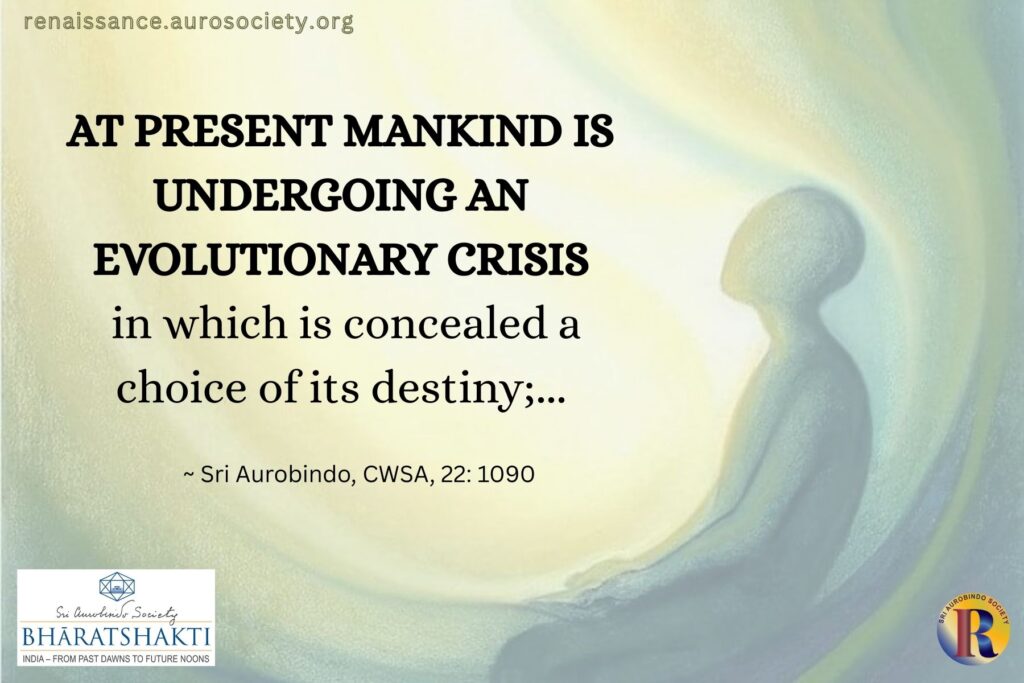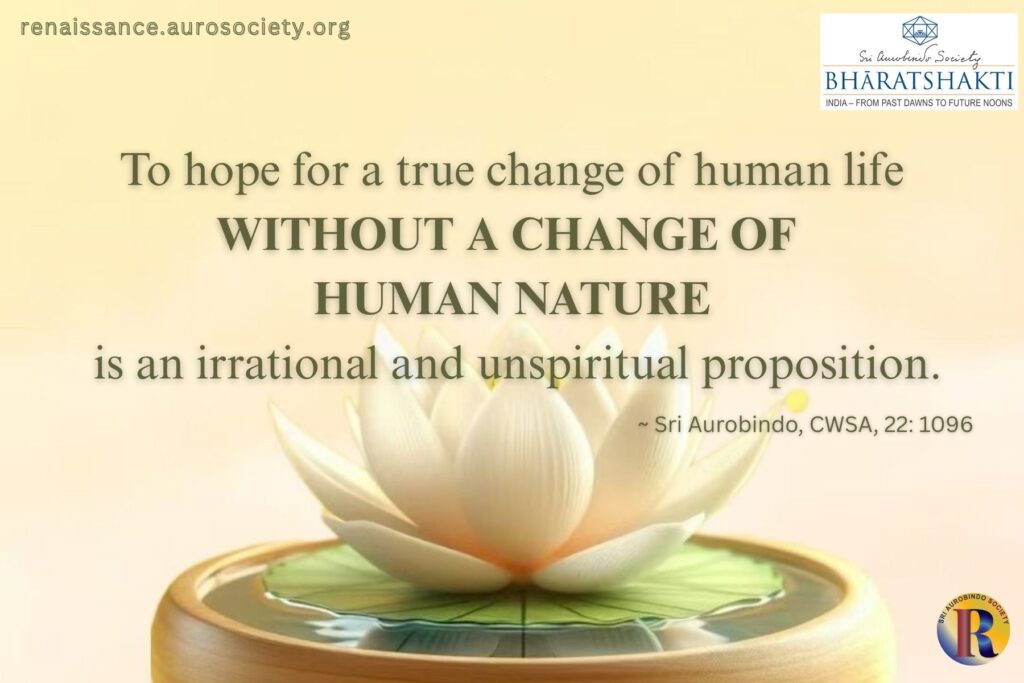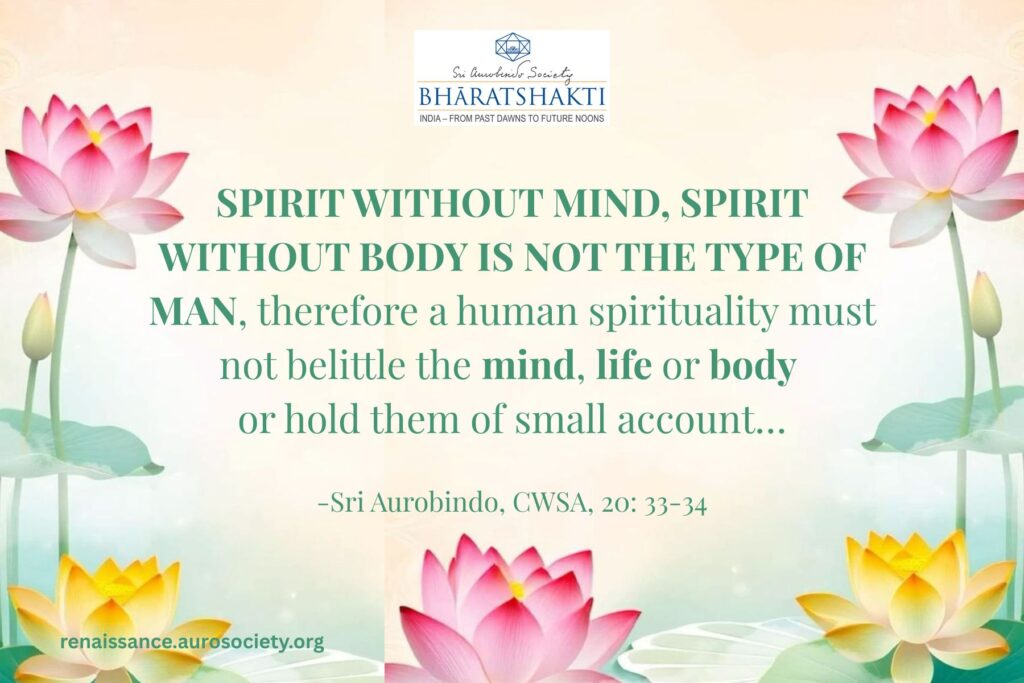Volume II, Issue 3
Author: Sri Aurobindo and the Mother
Editor’s note: A few passages from the Mother and Sri Aurobindo help us remind how important it is to constantly purify ourselves to ensure that no hypocrisy enters into our consciousness. These words also serve as a wake-up call when we go into a state of inertia and forget the inner work needed to aspire for greater sincerity.

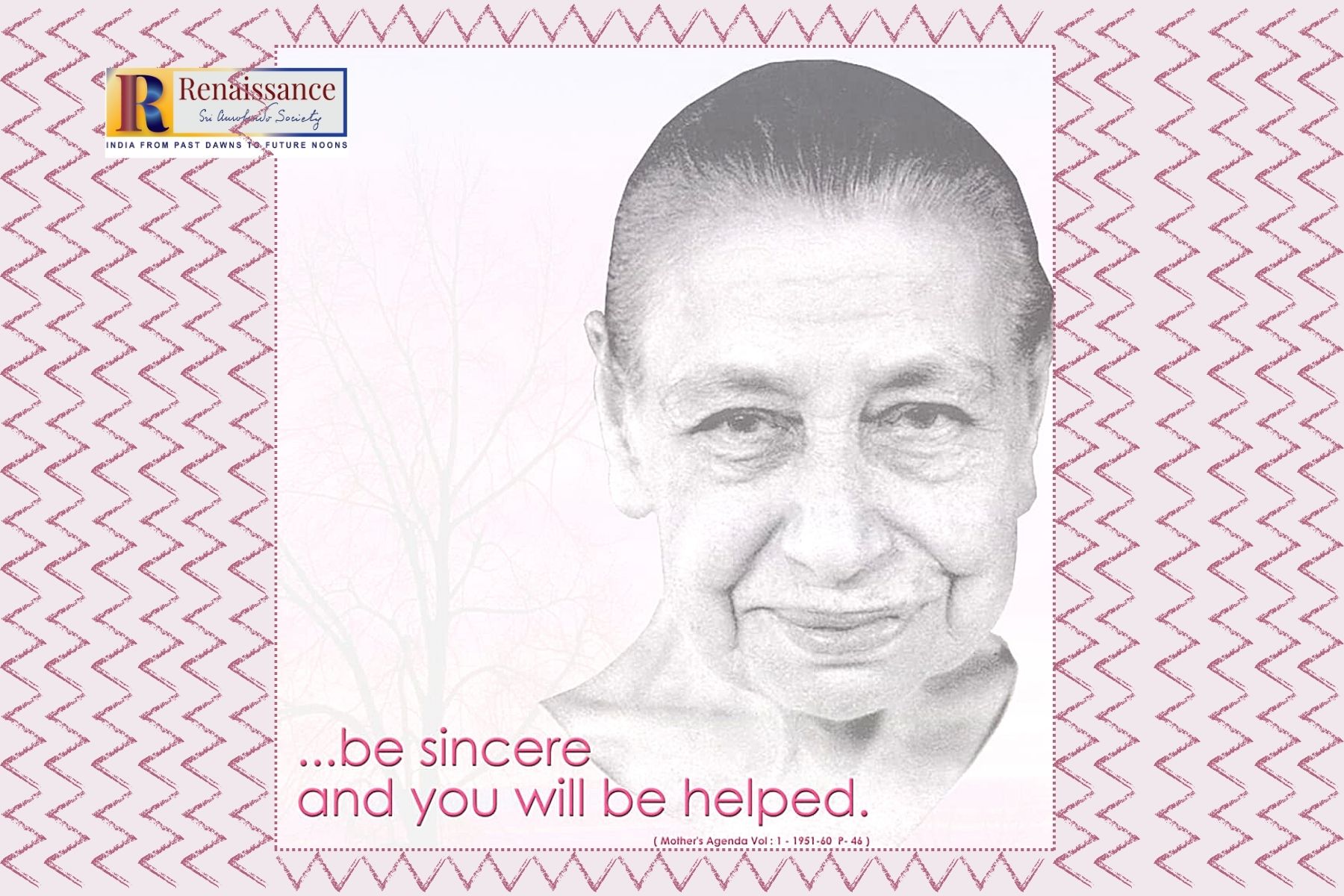
I have never said that Yoga or that this Yoga is a safe and easy path. What I say is that anyone who has the will to go through can go through. For the rest, if you aim high, there is always the danger of a steep fall if you misconduct your aeroplane.
But the danger is for those who allow themselves to entertain a double being, aiming high but also indulging their lower outlook and hankerings. What else can you expect when people do that? You must become single-minded, then the difficulties of the mind and vital will be overcome. Otherwise those who oscillate between their heights and their abysses, will always be in danger till they have become single-minded.
That applies to the “advanced” as well as to the beginner. These are facts of nature — I can’t pretend for anybody’s comfort that they are otherwise. But there is the fact also that nobody need keep himself in this danger. One-mindedness (ekanisthā), surrender to the Divine, faith, true love for the Divine, complete sincerity in the will, spiritual humility (real, not formal) — there are so many things that can be a safeguard against any chance of eventual downfall.
Slips, stumbles, difficulties, upsettings everyone has; one can’t be insured against these things, but if one has the safeguards, they are transitory, help the nature to learn and are followed by a better progress.
(Sri Aurobindo, CWSA, Vol. 31, pp. 674-75)

Give yourself completely without demand
To walk through life armoured against all fear, peril and disaster, only two things are needed, two that go always together—the Grace of the Divine Mother and on your side an inner state made up of faith, sincerity and surrender. Let your faith be pure, candid and perfect.
An egoistic faith in the mental and vital being tainted by ambition, pride, vanity, mental arrogance, vital self-will, personal demand, desire for the petty satisfactions of the lower nature is a low and smoke-obscured flame that cannot burn upwards to heaven.
Regard your life as given you only for the divine work and to help in the divine manifestation. Desire nothing but the purity, force, light, wideness, calm, Ananda of the divine consciousness and its insistence to transform and perfect your mind, life and body.
Ask for nothing but the divine, spiritual and supramental Truth, its realisation on earth and in you and in all who are called and chosen and the conditions needed for its creation and its victory over all opposing forces.
Let your sincerity and surrender be genuine and entire. When you give yourself, give completely, without demand, without condition, without reservation so that all in you shall belong to the Divine Mother and nothing be left to the ego or given to any other power.
The more complete your faith, sincerity and surrender, the more will grace and protection be with you. And when the grace and protection of the Divine Mother are with you, what is there that can touch you or whom need you fear?
A little of it even will carry you through all difficulties, obstacles and dangers; surrounded by its full presence you can go securely on your way because it is hers, careless of all menace, unaffected by any hostility however powerful, whether from this world or from worlds invisible. Its touch can turn difficulties into opportunities, failure into success and weakness into unfaltering strength.
For the grace of the Divine Mother is the sanction of the Supreme and now or tomorrow its effect is sure, a thing decreed, inevitable and irresistible.
(Sri Aurobindo, CWSA, Vol. 32, pp. 8-9)

Strength, Sincerity and Grace
There is nothing unintelligible in what I say about strength and Grace. Strength has a value for spiritual realisation, but to say that it can be done by strength only and by no other means is a violent exaggeration. Grace is not an invention, it is a fact of spiritual experience.
Many who would be considered as mere nothings by the wise and strong have attained by Grace; illiterate, without mental power or training, without “strength” of character or will, they have yet aspired and suddenly or rapidly grown into spiritual realisation, because they had faith or because they were sincere.
I do not see why these facts which are facts of spiritual history and of quite ordinary spiritual experience should be discussed and denied and argued as if they were mere matters of speculation. Strength, if it is spiritual, is a power for spiritual realisation; a greater power is sincerity; the greatest power of all is Grace.
I have said times without number that if a man is sincere, he will go through in spite of long delay and overwhelming difficulties. I have repeatedly spoken of the Divine Grace. I have referred any number of times to the line of the Gita:
Aham tvā sarvapāpebhyo moksayisyāmi mā śucah
“I will deliver thee from all sin and evil, do not grieve.”
(Sri Aurobindo, CWSA, Vol. 29, p. 172)
. . . the conversion of great sinners into great saints, of men of little or no virtue into spiritual seekers and God-lovers has frequently happened in religious and spiritual history — as in Europe St. Augustine, in India Chaitanya’s Jagai and Madhai, Bilwamangal and many others.
The house of the Divine is not closed to any who knock sincerely at its gates, whatever their past stumbles and errors. Human virtues and human errors are bright and dark wrappings of a divine element within which once it pierces the veil, can burn through both towards the heights of the Spirit.
(Sri Aurobindo, CWSA, Vol. 29, p. 42)

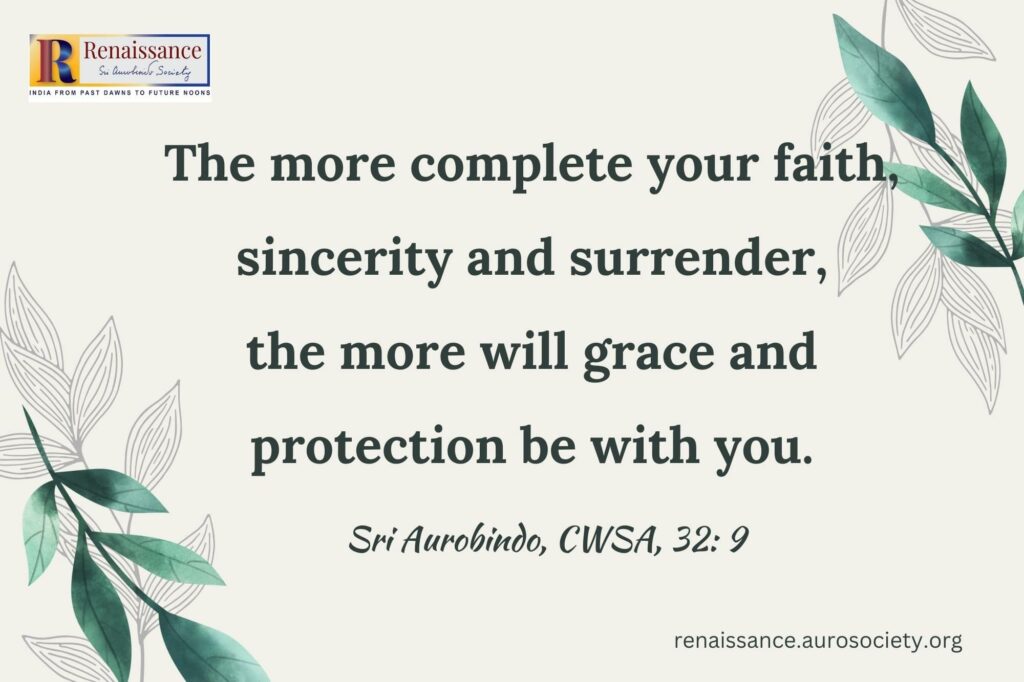

Only by spiritual endeavour one can realise complete sincerity
Men are always mixed and there are qualities and defects mingled together almost inextricably in their nature. What a man wants to be or wants others to see in him or what he is sometimes on one side of his nature or in some relations can be very different from what he is in the actual fact or in other relations or on another side of his nature.
To be absolutely sincere, straightforward, open, is not an easy achievement for human nature.
It is only by spiritual endeavour that one can realise it—and to do it needs a severity of introspective self-vision, an unsparing scrutiny of self-observation of which many sadhaks or Yogins even are not capable and it is only by an illumining Grace that reveals the sadhak to himself and transforms what is deficient in him that it can be done. And even then only if he himself consents and lends himself wholly to the divine working.
(Sri Aurobindo, CWSA, Vol. 29, p. 51)
…the most important thing for purification of the heart is an absolute sincerity.
No pretence with oneself, no concealment from the Divine or oneself or the Guru, a straight look at one’s nature and one’s movements, a straight will to make them straight. It does not so much matter if it takes time; one must be prepared to make it one’s whole life-task to seek the Divine.
Purifying the heart means after all a pretty considerable achievement and it is no use getting despondent, despairful etc. because one finds things in oneself that still need to be changed. If one keeps the true will and true attitude, then the intuitions or intimations from within will begin to grow, become clear, precise, unmistakable and the strength to follow them will grow also.
And then before even you are satisfied with yourself, the Divine will be satisfied with you and begin to withdraw the veil by which he protects himself and his seeker against a premature and perilous grasping of the greatest thing to which humanity can aspire.
(Sri Aurobindo, CWSA, Vol. 30, p. 43)
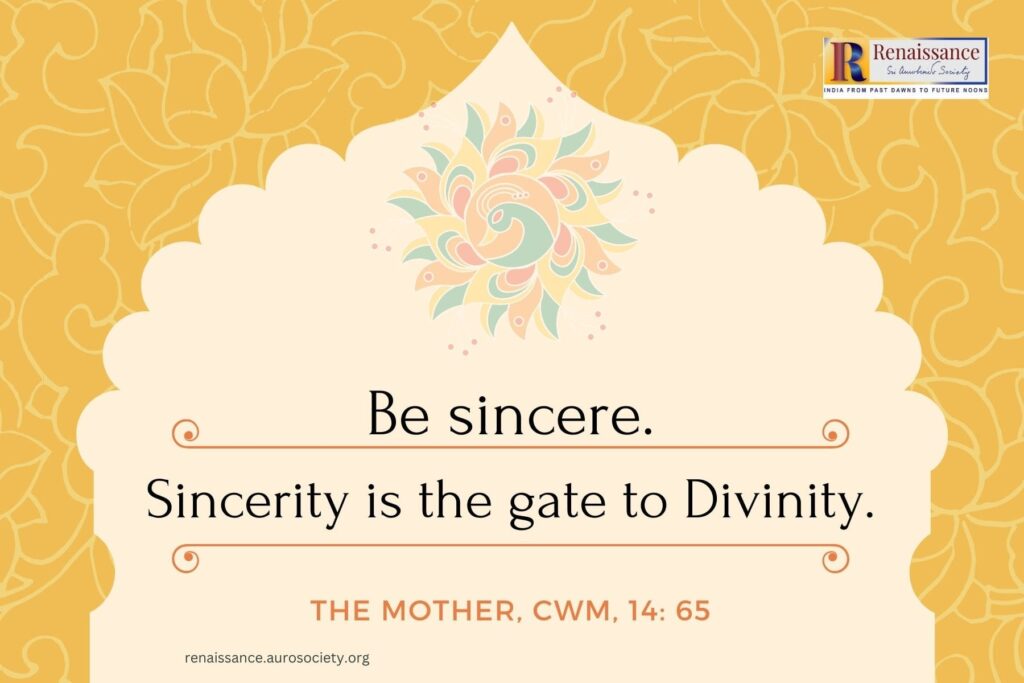
It is difficult for the ordinary Christian to be of a piece, because the teachings of Christ are on quite another plane from the consciousness of the intellectual and vital man trained by the education and society of Europe—the latter, even as a minister or priest, has never been called upon to practise what he preached in entire earnest.
But it is difficult for the human nature anywhere to think, feel and act from one centre of true faith, belief or vision.
The average Hindu considers the spiritual life the highest, reveres the Sannyasi, is moved by the Bhakta; but if one of the family circle leaves the world for spiritual life, what tears, arguments, remonstrances, lamentations! It is almost worse than if he had died a natural death.
It is not conscious mental insincerity—they will argue like Pandits and go to Shastra to prove you in the wrong; it is unconsciousness, a vital insincerity which they are not aware of and which uses the reasoning mind as an accomplice.
That is why we insist so much on sincerity in the Yoga—and that means to have all the being consciously turned towards the one Truth, the one Divine. But that for human nature is one of the most difficult of tasks, much more difficult than a rigid asceticism or a fervent piety.
Religion itself does not give this complete harmonised sincerity—it is only the psychic being and the one-souled spiritual aspiration that can give it.
(Sri Aurobindo, CWSA, Vol. 29, pp. 53-54)
See:
Sincerity and Religion


To make the material life the expression of one’s highest aspiration makes one noble, upright and sincere in character
In every normal being there is the necessity, the need―an absolute need to translate into a physical form what he feels and wants internally. I consider those who always want to evade life in order to have self-realisation as abnormal and incomplete. And in fact, these are usually weak natures.
But those who have strength, force and a kind of healthy equilibrium in themselves, feel an absolute need to realise materially their spiritual realisation; they are not satisfied with going away into the clouds or into worlds where forms no longer exist. They must have their physical consciousness and even their body participate in their inner experience.
Now, it may be said that the need to adopt or follow or participate in a religion as it is found all ready-made, arises rather from the “herd instinct” in human beings. The true thing would be for each one to find that form of adoration or cult which is his own and expresses spontaneously and individually his own special relation with the Divine; that would be the ideal condition. . . .
But to want to translate into the forms of one’s physical life the inner aspiration and adoration is quite legitimate, and it is much more sincere than what is done by a man who splits himself into two, leads a physical life quite mechanically and ordinarily and, when he can do it, when he has the time or when it suits him, withdraws within himself, escapes from physical life and the physical consciousness and goes to far-off heights to find his spiritual joys.
Someone who tries to make his material life the expression of his highest aspiration is certainly more noble, more upright and sincere in character than a man who splits himself into two saying that the outer life is of no importance and will never change and must be accepted as it is, and that, in reality only the inner attitude counts.
(The Mother, CWM, Vol. 8, pp. 246-47)
~ Graphic design: Beloo Mehra

